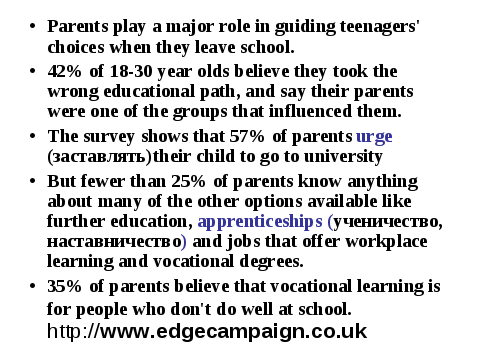- Преподавателю
- Иностранные языки
- Урок, английский язык 8 класс на тему Выбор профессии
Урок, английский язык 8 класс на тему Выбор профессии
| Раздел | Иностранные языки |
| Класс | 8 класс |
| Тип | Конспекты |
| Автор | Карагодина И.В. |
| Дата | 18.07.2015 |
| Формат | doc |
| Изображения | Есть |
Английский язык
Тема урока: Выбор профессии
8 класс, О.В. Афанасьева, И.М. Михеева, English VIII
Учитель: Карагодина Ирина Викторовна
«Choosing a career»
Цель урока: организовать деятельность учащихся по формированию навыков и умений обсуждать прочитанное, выделять основные идеи текста, дискутировать, делать выводы; способствовать личностному самоопределению учащихся в отношении их будущей профессии
Оборудование урока: компьютер, мультимедийный проектор, раздаточный материал (копия статьи из газеты "The Independent", распечатка страницы вебсайта edgecampaign.co.uk), учебники.
Литература: О.В.Афанасьева, И.М.Михеева. English VIII, газета "The Independent" 11 September 2007, edgecampaign.co.uk, Encarta dictionary.
Ход урока:
№ п/п
Этап урока
Задачи этапа
Форма работы
Организационный момент.
Подготовка учащихся к речевой деятельности. Формулирование темы и цели урока.
Фронтальная
Работа с лексикой.
Активизация ранее изученной лексики в речевых структурах.
Фронтальная
Устная речь.
Развитие умений участвовать в беседе, выражать свое мнение на основе информации, полученной из печатных источников (текст, газеты)
Индивидуальная
Фронтальная
Парная
Чтение (изучающее) как основа для последующего высказывания.
Развитие умений понимать аргументацию, определять свое отношение к прочитанному.
Индивидуальная
Фронтальная
Монологическая речь
Развитие умений рассуждать, приводя примеры, аргументы, делая выводы
Групповая
Индивидуальная
Итоги урока.
Рефлексия.
Объяснение домашнего задания.
I.
Teacher: Good morning, I'm glad to see you.
Look, what I've brought for you. (учитель показывает предметы, говорящие о профессии: аптечка (medicine chest), классный журнал (class register), CD, словарь (dictionary), молоток (hammer), отвертка (screwdriver), ножницы (scissors) , расческа (comb), сантиметр (tape measure), нитки (thread).
Now I'm going to divide them into 2 groups. (учитель раскладывает предметы на две группы, называя их. 1 группа - medicine chest, class register, CD, dictionary; 2 группа - hammer, screwdriver, scissors, comb, tape measure, thread).
What do all the things in each of the groups have in common? What education do you need to use these things?
P - To use these things we should have a university degree.
P - To use those things we should have a vocational training.
Teacher: So there are two ways to success: via vocational training and via university.
BUT: (Учитель обращает внимание учеников на вопросы, написанные на доске)
What should we take into account choosing a career? and
Is it necessary to get higher education to be successful?
I hope, by the end of today's lesson you will be able to answer these questions.
II.
Teacher: Please, tell me what professions require and what professions do not require higher education. These pictures will help you. (слайды 2,3)
С лайд 2
лайд 2
С лайд 3
лайд 3
Учащиеся называют профессии, которые требуют или не требуют высшего образования.
P - If you want to be a … you should get a university degree.
P - If you want to be a … you should study at vocational school.
Учащиеся употребляют введенную на предыдущем уроке лексику по теме «Профессии» (стр.34-35 учебника).
III.
Teacher: You know that while choosing a career we should take into account some important things. What are they?
P1 - We should take into account our interests when choosing a career.
P2 - I think it's important to identify our skills and talents.
P3 - I think we should try to become broadly educated
P4 - Improve our computer and technical skills and keep on learning is also very important.
P5 - If someone we know has a career that interests us, we should look into it. Talk to graduates of the education and training programs we are interested in.
P6 - We should be ready to change and adapt.
P7 - And of course, we should take into account career market. We should find out what jobs are necessary.
Teacher: I see that you are ready to give some advice to school leavers. Ex. 67 p.39 will help you. Open your books. Read and say what jobs you would recommend these school leavers if you were a career adviser. Explain your choice. (Учитель распределяет части текста между парами учащихся, каждая пара готовит ответ по своей части текста.)
P1- I would recommend Sam to be a driver, because he likes working with machines, has driving license.
P 2- I would not recommend Lisa to enter a university, because she is not very advanced academically, but she is very sociable, so she can be a shop assistant, a hairdresser, a receptionist or a waitress.
P3 - I would recommend Melissa to become a librarian or a journalist, because she likes reading and writing. May be she can become a teacher.
P4 - I would recommend Kevin to be a photographer, because…
P5 - I would recommend Pauline to be a veterinarian or a farmer, because …
Teacher: Thank you. Your home task for today was to look through newspapers and find out what "hot jobs" in our region are. Who wants to share the information with us?
P1 - I have found out that motor vehicle technicians, plumbers, carpenters and cooks are "hot jobs" in Belgorod.
P2 - I have found out that experienced electricians, builders, sellers, shop assistants, hairdressers, accountants are "hot jobs" in Belgorod.
P3 - I have found out that we need a lot of drivers, nurses, nannies for little kids, waiters ….
P4 - I have found out that experienced engineers, accountants, economists and dentists are "hot jobs" in Belgorod.
P5 - and I have found out that many engineers, accountants, economists and lawyers are looking for jobs.
Teacher: According to this information, are there more "hot jobs" for vocational school leavers or for university graduates?
P - For vocational school leavers.
Teacher: Then, why do you think most teens try to enter University and get higher education in spite of the fact that it is easier to find a job after finishing vocational or technical schools? What are your ideas?
P1- They think that vocational learning is for people who don't do well at school
P2 - Because their friends enter the university
P3 - They are afraid they can't find a well- paid job without having a degree.
P4 - They are not healthy enough to work somewhere at the factory or at the construction.
P5 - Their parents want them to get higher education
P6 - They want to have prestigious work
P7 -…
Teacher: Do you think that being a good auto mechanic or an experienced electrician is less prestigious than being a good doctor or a lawyer?
P3 - I think that if you are skilled and experienced in your job, people will respect you.
P1 - If somebody loves cars and can spend hours helping his father to fix his car he can become a good and well-paid mechanic in future.
P2 - At the same time if you want to get a well-paid and prestigious job after graduating from the university you also need a lot of practice, because students at universities learn a lot of theory and do not focus on learning practical skills.
P3 - If you are interested in hairdressing or making clothes and try to be a good specialist, you will have many grateful clients in spite of the fact you have no university degree.
P4 - You can be a good specialist without a university degree but very often people think that vocational schools are for those who had bad marks at school
IV.
Teacher: Well you see this problem is rather a hot one and a lot of parents are wondering which is better for their kids: a university degree or vocational diploma? (Учитель показывает картинку из газеты "The Independent") Which kind of mortarboard is more suitable for them? (слайд 4)

You see, they are both mortarboards.
mortarboard
1.
academic hat: a hat often worn on formal academic occasions, consisting of a round cap with a hard square flat top and usually a tassel
Mortarboard - головной убор с квадратным верхом (у английских студентов и профессоров)
2.
board for carrying mortar: a square board, used by bricklayers for carrying mortar
Mortarboard - доска для смешивания строительного раствора
Teacher: Recently I've read a very interesting article on the problem. I want you to read this article, too, and find out what is the main message the author wants to get across.
Here some words and expressions you need to understand the text. (слайд 5)

(Учащиеся читают статью в течение 3-4 минут)
They are both mortarboards.
But why do you value them so differently?
Who's better, a builder or a businessman? A chef or a chief executive? A theoretical physicist or a theatre technician?
Truth is, as a society, we need all of them.
The fact that some of those roles will need a degree and the others vocational training, makes no difference. Which is why seeing university as the only way forward for our kids is so short sighted.
We take the view that vocational qualifications are the equal of academic study. Because vocational training isn't for 'less clever kids'.
It's for kids who find their ambitions and abilities exist outside the confines of the classroom. For young people who don't want to put off starting a career for three or four years at university
And the vocational route, with the opportunities it offers, could be right for your kids.
You can find more at our website.
"The Independent" 11 September 2007
Teacher: What are your ideas?
P- The main problem is that most people think that vocational education is for 'less clever kids'
P- The author tries to convince readers that as a society, we need both builders and businesspersons, chefs and chief executives, theoretical physicists and theatre technicians.
P - The author wants to prove that vocational qualifications are the equal of academic study. Vocational training is for kids who find their ambitions and abilities exist outside the confines of the classroom.
P - The main problem is that people make a great difference between the professions which need a degree, and those, which need vocational training.
P - In the article the author advertises vocational training, because the society needs skilled workers.
Teacher: The author invites us to visit their website. Why not?
Will you read this information and think of the answers to the questions.
Do you think that we have the same problems in Russia?
What information surprised you? (слайд 7)

P1 - I agree with the fact that parents play a major role in guiding teenagers' choices when they leave school.
P 2- I am sure both in Britain and in Russia not all adults are satisfied with the job, which parents had chosen for them.
P3 - Both in Russia and in Britain many parents consider that going to university is the only route to success and they urge their children to enter university.
V.
Teacher: Now I want you to form two groups. Each group will sum up the ideas we've discussed at our lesson and answer one of the questions:
What should we take into account choosing a career?
Is it necessary for you to get higher education to be successful in life?
(ученики выполняют задание в группе в течение 3-4 минут)
Teacher: Who will represent the work of the group? (по одному ученику от группы представляют итог работы - монологическое высказывание по 5-6 предложений)
VI.
Teacher: So, have we answered the questions of the lesson? Can you say what you should take into account choosing a career?
(Ученики отвечают на вопрос учителя).
Teacher: At home you will write an essay "What should we take into account choosing a career?" or "Is it necessary to get higher education to be successful?"
Thank you for your work.
12Карагодина Ирина Викторовна. МАОУ «Гимназия №1» г. Белгород


